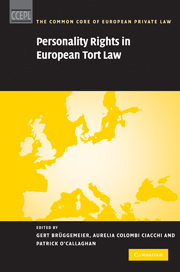Book contents
- Frontmatter
- Contents
- List of contributors
- National reporters
- General editors' preface
- Preface
- Editorial note
- List of abbreviations
- Part I Mapping the legal landscape
- Part II Case studies
- 4 Case 1: The corrupt politician
- 5 Case 2: Convicted law professor
- 6 Case 3: The paedophile case
- 7 Case 4: An invented life story?
- 8 Case 5: A former statesman's family life
- 9 Case 6: A satirical magazine
- 10 Case 7: A snapshot of a person
- 11 Case 8: A paparazzo's telephoto lens
- 12 Case 9: Naked.Little.Girl.Com
- 13 Case 10: The late famous tennis player
- 14 Case 11: The popular TV presenter
- 15 Case 12: Copied emails
- 16 Case 13: Brigitte's diaries
- 17 Case 14: Tape recordings of a committee meeting
- 18 Case 15: ‘Light cigarettes reduce the risk of cancer’
- 19 Case 16: Doctor's non-disclosure of a foetal disease
- 20 Case 17: WAF – A gang of incompetents?
- Part III A common core of personality protection
- Index
14 - Case 11: The popular TV presenter
from Part II - Case studies
Published online by Cambridge University Press: 06 July 2010
- Frontmatter
- Contents
- List of contributors
- National reporters
- General editors' preface
- Preface
- Editorial note
- List of abbreviations
- Part I Mapping the legal landscape
- Part II Case studies
- 4 Case 1: The corrupt politician
- 5 Case 2: Convicted law professor
- 6 Case 3: The paedophile case
- 7 Case 4: An invented life story?
- 8 Case 5: A former statesman's family life
- 9 Case 6: A satirical magazine
- 10 Case 7: A snapshot of a person
- 11 Case 8: A paparazzo's telephoto lens
- 12 Case 9: Naked.Little.Girl.Com
- 13 Case 10: The late famous tennis player
- 14 Case 11: The popular TV presenter
- 15 Case 12: Copied emails
- 16 Case 13: Brigitte's diaries
- 17 Case 14: Tape recordings of a committee meeting
- 18 Case 15: ‘Light cigarettes reduce the risk of cancer’
- 19 Case 16: Doctor's non-disclosure of a foetal disease
- 20 Case 17: WAF – A gang of incompetents?
- Part III A common core of personality protection
- Index
Summary
Case
A popular TV presenter with a very distinctive voice once did a voiceover on some adverts for a coffee company. After he had made it clear that he did not want to do any more of these adverts, the company produced a radio commercial in which his voice had been imitated by another person. Can the TV presenter sue the company for an injunction and compensation?
Discussions
Austria
Operative rules
The presenter can claim for forbearance and for compensation under the law of unjust enrichment. He also might have a claim for noneconomic damages. Economic damages are probably not recoverable in this case.
Descriptive formants
A right to one's own spoken words and to the protection of one's characteristic voice against imitation can be established on the basis of a consideration of other personality rights and constitutional aspects (above all Art. 10 ECHR) and a general weighing of interests, combined with § 16 ABGB.
In 2001, the OLG Wien (Higher Regional Court of Vienna) passed judgment on a similar case, tackling the same problems as the case at hand. The court had to decide whether to issue a preliminary injunction in relation to a radio commercial for a political campaign in which the voices of actors from a well-known television series were imitated. In another decision addressing the same legal dispute, the OGH approved the protection of someone's characteristic voice against exploitation through use in a commercial.
- Type
- Chapter
- Information
- Personality Rights in European Tort Law , pp. 413 - 432Publisher: Cambridge University PressPrint publication year: 2010



